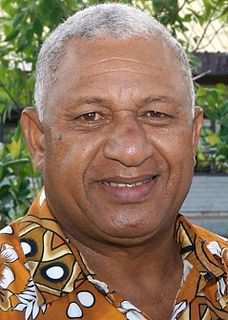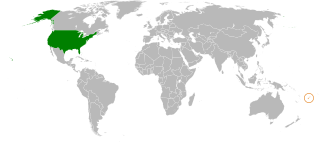| |||||||||||||||||||||||||||||||||||||
All 50 seats to the Parliament of Fiji | |||||||||||||||||||||||||||||||||||||
|---|---|---|---|---|---|---|---|---|---|---|---|---|---|---|---|---|---|---|---|---|---|---|---|---|---|---|---|---|---|---|---|---|---|---|---|---|---|
| Registered | 591,101 | ||||||||||||||||||||||||||||||||||||
| Turnout | 84.6% | ||||||||||||||||||||||||||||||||||||
| |||||||||||||||||||||||||||||||||||||
| |||||||||||||||||||||||||||||||||||||
 |
|---|
| This article is part of a series on the politics and government of Fiji |
Legislative
|
Judiciary |
|
General elections were held in Fiji on 17 September 2014, [1] [2] to select the 50 members of the Fijian parliament. [3]

Fiji, officially the Republic of Fiji, is an island country in Melanesia, part of Oceania in the South Pacific Ocean about 1,100 nautical miles northeast of New Zealand's North Island. Its closest neighbours are Vanuatu to the west, New Caledonia to the southwest, New Zealand's Kermadec Islands to the southeast, Tonga to the east, the Samoas and France's Wallis and Futuna to the northeast, and Tuvalu to the north. Fiji consists of an archipelago of more than 330 islands—of which 110 are permanently inhabited—and more than 500 islets, amounting to a total land area of about 18,300 square kilometres (7,100 sq mi). The most outlying island is Ono-i-Lau. The two major islands, Viti Levu and Vanua Levu, account for 87% of the total population of 898,760. The capital, Suva, on Viti Levu, serves as the country's principal cruise-ship port. About three-quarters of Fijians live on Viti Levu's coasts, either in Suva or in smaller urban centres such as Nadi—where tourism is the major local industry—or Lautoka, where the sugar-cane industry is paramount. Due to its terrain, the interior of Viti Levu is sparsely inhabited.

The Parliament of Fiji is the unicameral legislature of the Republic of Fiji. It consists of 51 members elected every 4 years using open-list proportional representation in one multi-member nationwide constituency.
Contents
The incumbent Prime Minister, Frank Bainimarama, was re-elected. Prior to the election Bainimarama was an Independent but stood for the FijiFirst Party in 2014. The Social Democratic Liberal Party and the National Federation Party both got over 5%, the threshold for a party or independent to have seats in the parliament. [4]

Josaia Voreqe Bainimarama CF, MSD, OStJ, known commonly as Frank Bainimarama and sometimes by the chiefly title Ratu, is a Fijian naval officer and politician who has been Prime Minister of Fiji since 2007. He was the Commander of the Fijian Military Forces from 1999 to 2014. While holding the office of Prime Minister, he has temporarily held various ministerial portfolios: Information, Home Affairs, Immigration, Public Service, Indigenous and Multi-Ethnic Affairs, Finance, and Foreign Affairs.

The Social Democratic Liberal Party (SODELPA) is a Taukei ethno-nationalist political party in Fiji. The party was formed in January 2013 after the dissolution of the Soqosoqo Duavata ni Lewenivanua. The party's leader is Sitiveni Rabuka.

The National Federation Party is a Fijian political party founded by A.D. Patel in November 1968, as a merger of the Federation Party and the National Democratic Party. Though it claimed to represent all Fiji Islanders, it was supported, in practice, almost exclusively by Indo-Fijians whose ancestors had come to Fiji, mostly as indentured labourers, between 1879 and 1916.
The elections were originally scheduled for March 2009, but were not held then because politicians did not agree to the People's Charter for Change, Peace and Progress. Between 2009 and 2014 many public announcements and requests were made and on 23 March 2014 the interim government announced the election would be held on 17 September 2014.
The People's Charter for Change, Peace and Progress was a proposed legal document which would have complemented the 1997 Constitution of Fiji. It would have established compulsory guidelines for any government policy in Fiji over the coming years. The People's Charter was due to be completed and come into force prior to the scheduled 2014 general election.
The elections were to be held under the new constitution which lowered the voting age to 18 and gave the right of multiple citizenship to Fijians for the first time.

Fiji's fourth constitution was signed into law by President Ratu Epeli Nailatikau on September 6, 2013, coming into effect immediately. It is the first to eliminate race-based electoral rolls, race-based seat quotas, district-based representation, the unelected upper chamber, and the role of the hereditary Council of Chiefs. It vests sole legislative authority in a single-chamber, 50-seat, at-large Parliament, to be first convened following general elections in 2014. It is also the first ever to grant the right to multiple citizenship, and lowers the voting age to 18.
Multiple citizenship, dual citizenship, multiple nationality or dual nationality, is a person's citizenship status, in which a person is concurrently regarded as a citizen of more than one state under the laws of those states. Conceptually, citizenship is focused on the internal political life of the state and nationality is a matter of international dealings.











